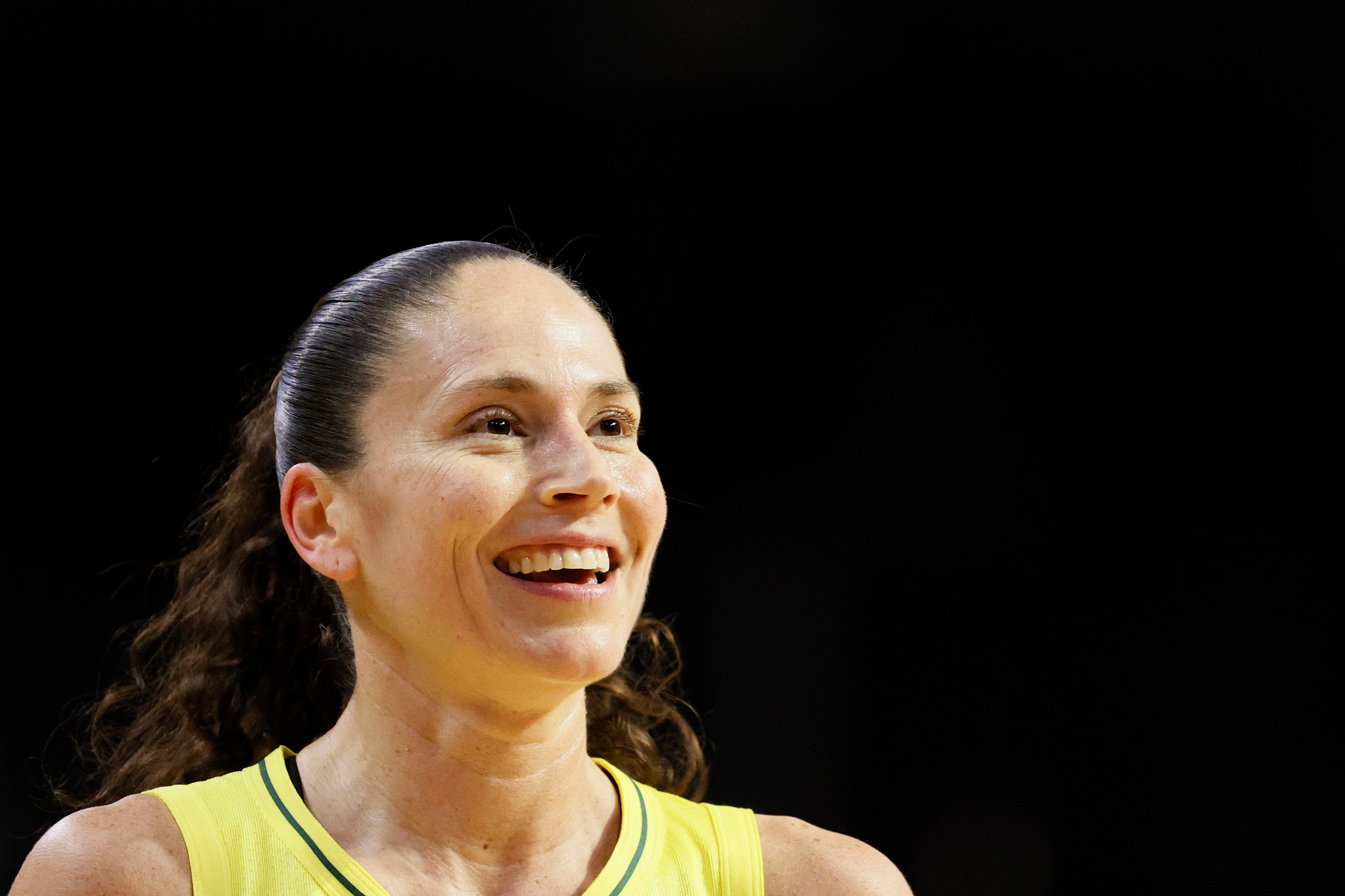Anyone who’s logged a minute in the WNBA has put up with some bullshit; if you’ve played in the league for nearly 20 of its 25 years, you might be the most patient person in the world. That’s the word that comes to mind to sum up Sue Bird, her sport’s ambassador for two decades and its most decorated star. Bird announced last week what she had all but confirmed in the offseason, that she will retire from basketball at the conclusion of her 19th WNBA season, at the age of 41. The retirement tour is already underway: On Sunday in New York, not far from the courts Bird tore up in high school, she hit a three that iced the game for the Storm. "Now, it's time to pass the torch," she said postgame, before throwing in a "Bing Bong!" for good measure. Sue Bird really knows how to please a crowd.
"BING BONG!"
— ESPN (@espn) June 19, 2022
Sue Bird out here having a blast in NY 😂 pic.twitter.com/oeKilrj8gS
In a league always wanting for institutions, Bird represents stability. It's a more difficult role than she's given credit for. Certainly, the WNBA took advantage of Bird's white, approachable, girl-next-door qualities. Her friend Diana Taurasi once teased her about this after Bird broke her nose in the great 2018 playoff series they played against each other: "When you have a nose like mine, you don’t give a shit. When you have a face like Sue, I would worry, too." The WNBA hasn't always treated its face well, though: Bird is old enough to remember a time before the WNBA marketed the hell out of her relationship with Megan Rapinoe, a time when the same league stuffed her into heels and asked her to make sultry faces to win over America. For all the progress Bird and her fellow union representatives have made, she earns a $72,000 vet minimum salary this year. And yet, she has only ever been the league's most ardent advocate. A Storm beat writer told me once that Bird was a dream to cover, a thoughtful conversationalist always eager to chat with reporters. Analytics are a favorite subject of hers, but she likes to talk and think in broader terms, too. "You can be a little disappointed with how things are, and in other ways, you can see how we're still on the rise," Bird told ESPN in 2017. "I think we're just waiting for that one moment."
Maybe it helped that she found career fulfillment otherwise. An NCAA, WNBA and Olympic champion by the age of 24, she could turn her hopes and energies outward. Bird will retire the rare, lucky athlete whose gifts weren't squandered by the team that drafted her. Her career has been charmed in many ways, never too far removed from a superstar teammate in Lauren Jackson and Breanna Stewart. That's not to say she isn't special in her own right. She's been the one drawing in defenses and threading the needles. The game that followed the broken nose ranks among the WNBA's single-best playoff performances. Bird adopted a masked alter ego that even this Rip Hamilton fan concedes has no equal, putting up 14 of 22 points in the fourth quarter of an elimination game. A quiet, pass-first style doesn't mean the killer instinct isn't there. She can get the job done when she needs to.
In 2003, when Bird was 22 years old and in her second season with the Storm, she made an appearance on a popular Seattle talk radio show called Mitch in the Morning, hosted by a shock jock-type named Mitch Levy. The idea of the radio hit was to pit the garden-variety women’s basketball hater against the up-and-coming star; if that sounds like an un-winnable battle, it's because it was. By the end of the interview, Bird had agreed to a stunt bet over her assist-turnover ratio. If she kept it above a certain threshold that year, Levy would buy Storm season tickets. If she didn't, she would have to yell, “Harder, daddy, harder,” while he spanked her on air. "He symbolizes that guy the league is trying to attract," Bird told the Seattle Times. "I believe that if I can get him in a seat to attend a game, then maybe his opinion will change and he'll talk about it on the air." When advocates complained that she’d set a bad example for young girls, an “embarrassed” Bird apologized and called off the bet. "It's typical Sue," her coach, Anne Donovan, said. "Happy go lucky. She thinks it's all fun and games."
Part of me hates to jam that story into what should be an upbeat blog. But it gets at what's enviable about Sue Bird. As a rule, the world exploits and punishes sincerity, enough so that there's little reason to stay sincere. And still, Bird has, despite cynicism's temptations. Don't forget that triumph amid the talk of her endurance and longevity. It's not only the physical kind: A person's spirit can wear and tear as easily as the tissue in a knee.
Natasha Cloud spoke last week about what Bird has meant to her own career. When Cloud's Mystics got swept by the Storm in the 2018 Finals, Cloud said, she saw in Bird exactly what she needed to be to win a championship. It was the small things: the way Bird kept her teammates engaged, the way she made younger players feel valued, her role as an extension of her coach. They're things you can detect across a basketball court—even through a television screen—and only admire. "Just trying to be more like Sue," Cloud said. "Everyone wants to be more like Sue."






